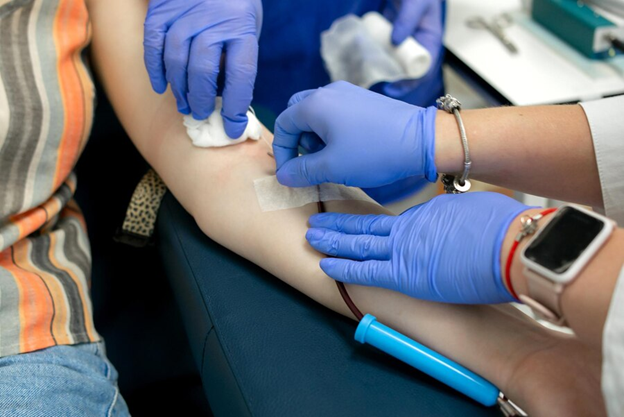Understanding what’s happening in your body can make a huge difference, especially if you have allergies. Allergy blood tests can identify what’s causing those sneezes and itches. Learning about these tests helps you manage your symptoms and improves your quality of life.
Understanding Allergies and the Need for Testing
Allergies are your body’s way of overreacting to certain harmless things, like pollen or dust. When exposed, your immune system kicks into overdrive, causing sneezes, itches, or worse. This can interfere with your daily life, making even simple tasks difficult and tiring.
Identifying your specific allergy in blood treatment needs can bring relief. Knowing the culprits behind those symptoms enables targeted solutions. Everyone’s allergies are different, so determining your particular triggers through testing is vital for effective management.
What Are Allergy Blood Tests?
An allergy blood test is a way to find out which allergens are causing your symptoms. There are two main types. The total immunoglobulin E test measures your overall IgE level, indicating if you have allergies. The specific IgE test pinpoints exact allergens, like cat dander or peanuts. Both tests help manage allergies by giving you a clearer picture of your triggers.
The Mechanism Behind Allergy Blood Tests
IgE antibodies are proteins your body makes in response to allergens. If your IgE levels are high, it indicates an allergy. During the test, a sample is drawn to see if IgE reacts to specific allergens. This reaction helps identify what causes your symptoms, offering insights into your allergies.
Ideal Situations for Allergy Blood Testing
A blood allergy test is useful if you have skin conditions or take medications that interfere with skin testing. It’s also recommended if you can’t stop medicines for existing allergies. This method is less invasive than skin tests, offering a simple way to detect a wide range of allergens simultaneously.
A Step-By-Step Guide to the Allergy Blood Test Process
Here’s how you can prepare and go through an allergy profile test:
- Preparation tips:
- There’s usually no need for fasting.
- Inform your doctor about all medications you’re taking.
- The drawing process:
- A healthcare professional draws your blood, usually from a vein in your arm.
- The process is quick, lasting only a few minutes.
- Receiving and interpreting results:
- Results come back in a week or so.
- Review them with a healthcare professional who can help you understand what they mean.
Decoding Your Allergy Blood Test Results
The RAST test measures specific IgE levels. High levels suggest allergies. Your results will show if your IgE antibodies reacted positively to common allergens. A negative result doesn’t always mean no allergies exist. Let a professional explain what your results mean and how to proceed.
Benefits of Allergy Blood Tests for Individuals
These tests are both safe and convenient. They don’t require you to stop medications and can test for many allergens at one go. You’ll get a comprehensive view of your body’s responses, enabling tailored allergy management without discomfort. Control your symptoms with a clear plan.
Comparing Allergy Blood Tests to Other Methods
Traditional tests include skin prick and patch tests. These methods require exposure to allergens on your skin. In contrast, a blood allergy test food can identify many allergens through a single sample. Plus, there’s less risk of a reaction. Though both methods have their merits, blood tests offer a more predictable process.
Common Allergens Detected in Blood Tests
Blood tests can identify various allergens:
- Food allergens: peanuts, shellfish, dairy
- Environmental allergens: pollen, dust mites, pet dander
The RAST blood test can be adapted for different regions to include local allergens. You’ll discover what’s triggering your allergies, whether it’s food or something in the air.
Maximizing the Benefits of Allergy Blood Tests
Testing lets you understand precise triggers and avoid them. Work with a doctor to develop a personalized allergy management plan. This plan targets triggers directly for improved control over your environment and food. Finally, live life with fewer symptoms disrupting your day.
Recognizing Limitations and Challenges
While beneficial, allergy blood tests aren’t perfect. They may sometimes result in false positives or negatives. Costs and access to testing can also be a barrier for some people. Consulting with a healthcare provider ensures better understanding and navigation of these issues.
What Comes After Allergy Blood Testing?
The next step is consulting with a healthcare professional to interpret your test results. They can guide additional tests or suggest lifestyle changes that align with your allergy profile. Living comfortably requires a proactive approach based on detailed insights from blood work for hives and other allergy tests.
Final Thoughts on Allergy Blood Tests
Allergy blood tests are an effective tool to understand what bothers your immune system. They help form a comprehensive strategy for managing your allergies. For best results, work closely with a healthcare professional who can offer guidance based on your specific needs and help you breathe, eat, and live more comfortably.

